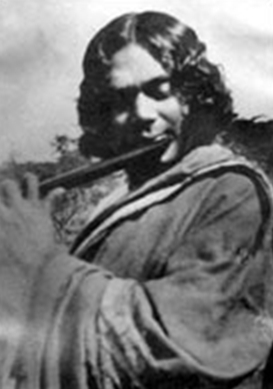Kazi Nazrul Islam
(Created page with "{| class="wikitable" |- |colspan="0"|<div style="font-size:100%"> This is a collection of articles archived for the excellence of their content.<br/>You can help by converting...") |
Revision as of 15:06, 5 January 2014
This is a collection of articles archived for the excellence of their content. Readers will be able to edit existing articles and post new articles directly |
Kazi Nazrul Islam
The egalitarian poet
By Jalil Ahmed
The 109th Joyanti (birth anniversary) of Kazi Nazrul Islam, the rebel poet of Bengal, was celebrated this past May. He was a rare quality poet and musician par excellence. He had a clear vision of gender equality and firmly believed that ‘art is for the people’. Being egalitarian in approach, he launched a vigorous assault on extremism and dogmatism.
Nazrul Islam, for the first time, effectively incorporated Urdu, Persian and Arabic words and expressions in Bengali, the language which now ranks fifth among the languages spoken worldwide. After the conquest of Bengal by the Muslims in 1201 AD, Muslim immigrants of Turkish, Iranian and Arab descent migrated to Bengal in large numbers and assimilated with the natives through intermarriages. A large number of Turkish, Arabic and Persian words consequently entered the Bengali language.
Towards the early 19th century, under British patronage, a campaign was carried out by the pundits, appointed by Fort William College, Calcutta, in conjunction with missionaries to eliminate words associated with the Muslims and use Sanskrit words as substitutes.
However, Nazrul Islam, who had appeared on the Bengali literary scene as a ‘comet’, profusely used both new Arabic and Persian words, and words already current in the Muslim society in prose and poetry. He succeeded because he could create a wonderful poetic rhythm by the use of alliteration and assonance and thus get Bengali and non-Bengali words to merge into a phonic synthesis. The impetuosity of his verse and feelings carried both words and images like a huge torrent that swept away all rigid opposition.
As an epoch-making poet, he had perfect mastery over the rhythm of the language. His poetry is a world of miracles and beauty, primordial and sophisticated, vigorous and subtle.
He wrote and composed music for nearly 3,000 songs, collectively known as Nazrul Geeti (Nazrul songs), which are popular across Bangla-desh, West Bengal, Russia and elsewhere even today. How-ever records reveal that he also wrote around 4,000 poems and songs, many of which are still unretrieved.
Kazi Nazrul Islam, the son of Kazi Fakir Ahmed and Zahida Khatun, was born on May 24, 1899. He received religious education at a maktab and worked at a tender age as a muezzin at the mosque where his father was once Imam. Despite his earnest desire to do so, he could not complete his matriculation education because of financial problems.
During his youth, Nazrul Islam joined a folk-opera group inspired by his uncle Bazle Karim who was himself a well-known composer of songs in Arabic, Persian and Urdu. His association with the group had a strong influence on his literary career.
Today, instead of vanishing into oblivion, he continues to live in the hearts of the 200 million-strong Bengali population. His intellectual liveliness and golden voice still inspire youths. His name has become a continual accretion of fire for those who yearn for change. He suffered from a brain-stroke in 1942 and his literary career, which started in 1919, came to a sudden end.
Born into abject poverty, Nazrul Islam turned into a rebel and chose the harsh reality around him as the theme of his verses.
In a career spanning two decades he wrote several novels, short stories and dramas, numerous songs and poems which exhibited his genius and poetic sensibility. At the time it was common for most of the poets and writers to imitate Tagore’s linguistic and rhythmic styles. However, Nazrul Islam did not imitate Tagore because he had a different sensibility to express, as manifested in his poetic and prose writings.
Born into abject poverty, Nazrul Islam turned into a rebel and chose the harsh reality around him as the theme of his verses. His cause urged him to write a torrent of songs, poems and stories. He wanted to destroy the obsolete society and build anew. He desired the power to level off inequity and injustice, and replace these with fairness and dignity.
A critical survey of his works produced between 1921 and 1927 reveals three powerful themes: love, Muslim renaissance and the awakening of the common man. He depicted human love in Vadhanhara (Free of Bonds) which deals with frustration in love. In Vidrohi he voiced his reaction to the want of love in society, and his desire to create a new society through destruction if necessary.
Through a vast number of songs, poems and articles he called upon Muslims to wake up, and urged the people of British-ruled India to rise and fight for freedom. He yearned to inspire peasants and workers to destroy the exploiters and establish their own rights. His writings roused the anger of the British Government which sentenced him twice to rigorous imprisonment and proscribed his works on various occasions and on different pretexts.
In 1924 he married a Brahman girl named Prameela. She faithfully continued as his companion till his death. His first marriage to Nargis Khanum did not last because of some trivial issue, unacceptable to the sensitive Nazrul Islam.
His abiding love for the suffering common folk led him to engage with the periodical Langal (Plough) that hit the bookstands in 1925. His long poem Samyavad (Equality) speaks of his love for the poorer classes, his violent reaction against the exploiting classes, and his demand for a society free from exploitation and deprivation. Above all, he longed to erase divisions in society on account of differences in religions and sects.
Enthused with Islamic egalitarian philosophy, he assailed fanaticism in religion and denounced it as evil and inherently irreligious. He devoted himself to exploring the Quran and the sayings of the Prophet (peace be upon him). He was perhaps the first Bengali Muslim poet to effectively assimilate and integrate Muslim imagery and symbolism in Bengali literature. His poetic biography of Prophet Muhammad (peace be upon him), and the abundance of songs and poems on Muslim heroes, historical places and festivals eloquently testify his deeply-entrenched faith in Islam and in its intrinsic values. His works are rightly summed up as ‘a fascinating combination of devotion, mysticism, cultural unity, and political exhortations.’ His poems are universally appealing to Muslims because of their referential context and traditional imagery.
Scholars and critics are unanimous in their assessment that Nazrul Islam’s contributions towards the independence movement were in no way less than any other Muslim politician. He was directly or indirectly involved in the cause of Pakistan in those days. As a renaissance poet Nazrul Islam successfully generated confidence among Muslims through his fiery songs and poems and emboldened them to assert their Islamic faith.

